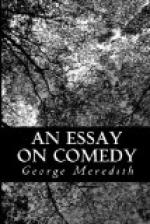look abroad with their own eyes, fewer still have
the habit of thinking for themselves. Life,
we know too well, is not a Comedy, but something strangely
mixed; nor is Comedy a vile mask. The corrupted
importation from France was noxious; a noble entertainment
spoilt to suit the wretched taste of a villanous age;
and the later imitations of it, partly drained of its
poison and made decorous, became tiresome, notwithstanding
their fun, in the perpetual recurring of the same
situations, owing to the absence of original study
and vigour of conception. Scene v. Act 2
of the Misanthrope, owing, no doubt, to the fact of
our not producing matter for original study, is repeated
in succession by Wycherley, Congreve, and Sheridan,
and as it is at second hand, we have it done cynically—or
such is the tone; in the manner of ‘below stairs.’
Comedy thus treated may be accepted as a version
of the ordinary worldly understanding of our social
life; at least, in accord with the current dicta concerning
it. The epigrams can be made; but it is uninstructive,
rather tending to do disservice. Comedy justly
treated, as you find it in Moliere, whom we so clownishly
mishandled, the Comedy of Moliere throws no infamous
reflection upon life. It is deeply conceived,
in the first place, and therefore it cannot be impure.
Meditate on that statement. Never did man wield
so shrieking a scourge upon vice, but his consummate
self-mastery is not shaken while administering it.
Tartuffe and Harpagon, in fact, are made each to
whip himself and his class, the false pietists, and
the insanely covetous. Moliere has only set
them in motion. He strips Folly to the skin,
displays the imposture of the creature, and is content
to offer her better clothing, with the lesson Chrysale
reads to Philaminte and Belise. He conceives
purely, and he writes purely, in the simplest language,
the simplest of French verse. The source of
his wit is clear reason: it is a fountain of
that soil; and it springs to vindicate reason, common-sense,
rightness and justice; for no vain purpose ever.
The wit is of such pervading spirit that it inspires
a pun with meaning and interest. {5} His moral does
not hang like a tail, or preach from one character
incessantly cocking an eye at the audience, as in recent
realistic French Plays: but is in the heart of
his work, throbbing with every pulsation of an organic
structure. If Life is likened to the comedy of
Moliere, there is no scandal in the comparison.
Congreve’s Way of the World is an exception to our other comedies, his own among them, by virtue of the remarkable brilliancy of the writing, and the figure of Millamant. The comedy has no idea in it, beyond the stale one, that so the world goes; and it concludes with the jaded discovery of a document at a convenient season for the descent of the curtain. A plot was an afterthought with Congreve. By the help of a wooden villain (Maskwell) marked Gallows to the flattest eye, he gets a sort of plot in The




